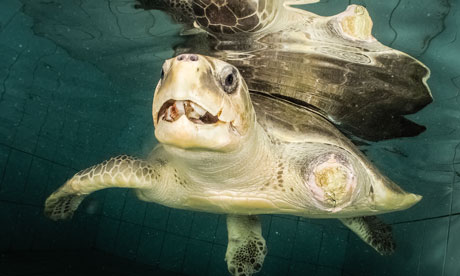
Call it CSI Turtle. In the Maldives, at the heart of the Indian Ocean, scores of turtles are being found with gashed or ripped-off flippers and deep scars in their shells. The cause is clear: the turtles are becoming ensnared in "ghost" fishing nets that have either have been lost or dumped.
The turtles that don't drown are then attacked mercilessly by accomplices. The stumps of the turtles' flippers show clear signs of being ripped off by sharks, while the shell damage points to a sharp implement: the beaks of birds and the claws of crabs. The nets themselves cut through the turtle's flesh like cheesewire, leaving deep wounds.
But what the investigation has not yet established are the culprits behind the crime and the motive. "It's OK to keep finding these turtles and keep stitching them up, but it's just going to keep happening. So we need to try to find out why the nets are being lost," says Dr Jill Hudgins, a scientist from the Seamarc consultancy and employed by the Four Seasons resort on Landaa Giraavaru island.
The turtles are the Olive Ridley variety, which live in the open ocean, not the atolls and lagoons of the Maldives, and Maldivian fishermen don't use nets, pointing the investigation abroad. Hudgins' team has now compiled a database of more than 40 net types, detailing the mesh size and the twine diameter, as well as the types of floats attached and other data like the labels on debris trapped in the net such as plastic bottles.
The evidence all points to trawler nets floating in from India and Sri Lanka, and a recent breakthrough was finding a net manufacturer's label: Garware, an Indian company. Hudgins has now sent images of the nets and severely injured turtles to the company and awaits their reply. "We want to scare them a bit," she says, and then get their help in finding solutions.
If it is because the fishermen do not have access to disposal facilities, she says, that could be set up. Or if boats fishing illegally are dumping nets when challenged by patrols at sea, that could be addressed too. Hudgins' team has also hooked up with Ghost Nets Australia, which successfully tracked nets back to fishermen in northern Australia.
So far 42 turtles have been released from the centre on Landaa Giraavaru and more islands are starting to join in. They spend an average of a month or two in rehab, after being treated.
The team has also demonstrated that the turtles can adapt to the loss of one fin by attaching £1,600 trackers to rehabilitated animals. "They travelled just as far – about 1,000km a month – as those not missing flippers," says Hudgins. But the loss of two fins is thought to be too much, making it near impossible for the turtles to dive and feed.
One turtle – which arrived with its skull split open, probably due to a boat collision – also travelled successfully, although in the opposite direction to the others.
But another turtle, now blind and with neurological problems probably due to being poisoned, has been at the centre for 18 months so far. Some are too injured to ever be likely to return to the ocean, and with a 60-year lifespan, Hudgins says: "They are going to be really long-term residents."
Source: http://www.theguardian.com/environment/2013/oct/01/turtle-injuries-maldives-lost-fishing-nets
No comments:
Post a Comment